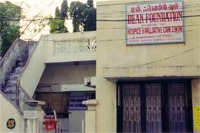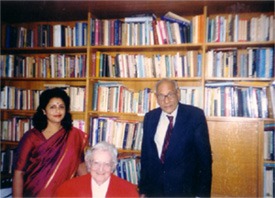OUR BEGINNINGS
Deepa grew up in the Nilgiris. After studying in the science stream for her Pre-University Course, she branched into Literature and took her first Post Graduate degree in Literature. Her second M.A. was in Journalism and Communication followed by an M.Phil. She then qualified in the UGC examination to teach at the university level. She worked in various fields but realized that she worked best with people. Reaching out and touching lives was what she did best. The "Tibetan Book of Living and Dying," by Sogyal Rinpoche, came into her life, changing her perspective and vision, giving structure to a cherished dream. The Book was lent to her by a friend and she read it, deeply moved by the philosophy of compassionate love and care for the dying and the futility in denying death or living in terror of it. The author, Sogyal Rinpoche, says that unconditional love and a more enlightened attitude can infuse sacred meaning to life and make dying a transformative, peaceful experience. He writes, "Don't most people die unprepared for death, as they have lived, unprepared for life? We can begin, here and now, to find meaning in our lives, make of every moment an opportunity to change and to prepare whole heartedly, precisely, and with peace of mind for death and eternity."
This book left a deep impact on Deepa. She realized that most of us are not prepared for death neither are we taught in any positive way how to deal with this event, which for all is a certainty. The main fear of death is whether we would suffer and what would come after. To believe there is nothing after death may be quite terrifying, and if there was a fervent belief in heaven or hell, we are afraid how we may be judged to be worthy of one or the other. Another fear is the final separation from all that is known and the ones we hold dear. Finally, the ones who are left behind are left to cope with all that ensues - emptiness, lack of purpose, financial strains, and so on.
Deepa realized that so many needed help with dying and she could perhaps find a way to ease this awesome transition. It was soon after that, when a relative, who was a doctor, returned from U.K. and talked about Palliative Medicine, that the way to help the dying revealed itself.
She shared her dream with two friends of the family, Rotarian and Past District Governor, Mr. K.V. Srinivasan of UNIPRO and Mr. K. Aravindan, Engineering Services Manager, Chennai Container Terminal. Both agreed with her vision of caring for the dying, of the need to address body, mind and spirit together, the interdependence of patient, family and caregiver and the academic imperative that united clinical care, research and training.

The Wheel of Light
On 9 March 1998, the three came together to lay the Foundation; the Trust was formally registered, as DEAN Foundation, an acronym for 'To Dignify and Empower the Ailing and the Needy'. The logo chosen was a spinning wheel of light, of life, of hope. The symbol this wheel stood for - that which is without a beginning or an end, the eternal cycle of birth and death, that we are in every moment, no matter what the circumstance, a perfect and eternal expression of the divine source. The wondrous shift from the physical reality to the new frequency is glorious in its light, separate from no one and nothing. The spokes in the wheel stand for the myriad expressions of life in different time locks. The movement of the wheel signifies that there is no end to life.
THE TRUST BEGAN WITH THE FOLLOWING OBJECTIVES:
- To offer free Palliative Care on an Out-patient and Home Care basis to the poor and homeless.
- To provide care to the children and the elderly keeping in mind their special needs.
- To create an environment of caring, acceptance, peace, and unconditional love.
- To extend information to those suffering from life threatening diseases about choices between or combining western, eastern and alternative therapies thereby achieving the best end-of-life quality.
- To support and comfort those experiencing grief, bereavement and loss, and require counseling or befriending thereby helping them to heal and grow.
- To provide a database on allied health services in the city through networking and referrals

Our first Centre
Meeting the pioneer of the modern Hospice Movement, Dame Cecily Saunders

Deepa, Dame Cecily Saunders & Mr. K.V. Srinivasan at St. Christopher's Hospice, London
To achieve these objectives, the medical personnel - doctors and nurses were specially trained. Deepa herself went to London, met the pioneer of the Modern Hospice Movement, Dame Cecily Saunders and spent time in St. Christopher's Hospice learning the ropes. She also visited three other Hospices in Vienna where she acquired different perspectives on the subject. Unfortunately, Mr. Srinivasan, who had accompanied her to London and travelled onwards to USA, died there after a massive heart attack. DEAN Foundation thus suffered her first bereavement.
The Board then invited Dr. B. Biswakumar, a neurophysician, who had lost his wife to breast cancer, to become a Trustee. Due to the paucity of funds, DEAN Foundation had to wait until October 1999 to begin operations. "It was a nightmare trying to get funds", says Deepa. "It was just a dream on paper with no staff, no infrastructure, just an idea that needed funds to take shape." They knocked at many doors. The reply was the same, "Come back when there is an organization up and running". It was the proverbial question, which comes first - the chicken or the egg?

Mr. K. Aravindan
It was then that Mr. Aravindan came forward to financially support the Trust. Aravindan had passed his Engineering from the Regional Engineering College, Calicut. He was the Engineering Services Manager in Kutch Container Terminal Pvt. Ltd., Mumbai, and had vast experience in human resources management and administration. He helped establish processes and operative systems for the smooth running of DEAN Foundation.
As a medical doctor on the Board of DEAN Foundation, with knowledge and expertise in both neurological as well as Palliative Care, Dr. Biswakumar, provided highly developed clinical expertise in pain and symptom management and ongoing medical supervision.
Both Dr. Biswakumar and Mr. Aravindan thus endeavoured to give back to society in their own unique ways.
Meanwhile, Deepa was offered a seat for the M.Sc. course in Palliative Care in the King's College of Medicine and Dentistry, London. The admission was kept open for three academic years but due to financial constraints, she was unable to accept the offer.
Mr. Aravindan continued to contribute generously from his salary to run the Trust and the Free clinic. Finding a proper place to set up the Clinic was the first problem faced by DEAN Foundation. There was no one willing to rent their premises for this kind of work. Staffing was extremely difficult. No doctors or nurses wished to work for the kind of salaries a charitable institution could afford nor did they want a specialization in Palliative Care, which is low on technology and high on touch. Even if they were willing to join, no one wanted to take the time for specialized training. Three doctors came and went before Dr. Nambudripad decided to stay. The nurse, Sr. Devadatha, who was the first employee, stayed on. Clinical work began on 6 October 1999, one and a half years after the Trust was registered.
Subsequently, in October 2001, DEAN Foundation shifted to a rented house in Kilpauk. A Free Out-Patient and Home Care Service was established with one full-time and a part-time doctor, a couple of nurses, administrative personnel and three full-time volunteers.
DEAN Foundation suffered a second loss when Mr. Aravindan passed away of Leukemia on 11 November 2004. His absence left a deep void in DEAN Foundation.
At present, thirty odd volunteers lend their free time to DEAN Foundation. A handful of doctors give free consultations for patients in their respective specializations. Deepa's full time services are also voluntary. Donations that trickle in from various sources help to run the place.
CURRENTLY, THE BOARD OF TRUSTEES COMPRISES OF :
- Mrs. Deepa Muthaiya, M.A. (Eng.Litt.), M.A. M.Phil. (Journalism & Communication); Chairman & Managing Trustee
- Dr. Ravi Sundar George, M.V.Sc., Ph.D., Retd. Professor and Head, Dept. of Veterinary Surgery and Radiology, Madras Veterinary College, TANUVAS
- Mr. Vikram H. Kalkura, B.Sc. Mathematics
CURRENT SCENARIO
DEAN Foundation looks after cancer patients and also those with geriatric related illness, neurological diseases, AIDS, etc. At present, we not only care for patients in the city but also in the peripheral districts. Our Home Care team consisting of a doctor, a nurse and volunteer travel great distances each day to various parts within and out of city limits to provide the support and care our patients need to make their end-stage painless and comfortable.
The care given by the Foundation does not force any medication or investigative tests on a patient. Caregivers help with dressing and daily hygiene routines and supervise nutritional inputs on being trained by DEAN Foundation. The centre is open to all kinds of alternate and complementary therapies of repute, provided it brings comfort to their patients.
DEAN Foundation at present functions out of
- Kilpauk, Chennai
- Paediatric Centre in ICH, Egmore, Chennai
- Tirupukkuzhi Block PHC, Kancheepuram District
- Karamadai, Coimbatore District
CHALLENGES
- Careers in this field are not lucrative and it is difficult to find medical personnel willing to work in this field.
- Lack of already trained medical and non-medical personnel in this field.
- Palliative care is not recognized as a basic human right.
- Lack of funds for an inpatient centre. Hired accommodation is often not as per requirements. Owners of rented premises will not allow in-patients fearing the stigma of death that gets associated with the building.
- By the time cases are referred, it is nearly always too late, making it difficult to enhance the quality of life that is left. Seventy-five percent of our cases are bedridden. If we could get the referrals at an early stage, our hands would be strengthened in dealing with the psychological problems thereby motivating the patients.
- Unlike European and American countries, the concept of professional care for the terminally ill, which aims at quality end-of-life days, without the pain of invasive procedures, is not considered essential, by a large majority of Indians and Health Care professionals.
FUTURE PLANS
The Trust's future objective is to open a Hospice to admit patients who have no place to go and who need care and nursing; where inpatients and destitutes can be admitted and no one faces the terrors of insecurity and loneliness, but are helped with love and compassion.
We plan to start a full fledged research centre, for work on pain relief and psychological and spiritual enhancement in end-of-life care.
The Trust believes that end-of-life quality can be enhanced through alternative therapies such as Yoga, Bach Flower Remedy, Music Therapy, Art Therapy, Aromatherapy, etc.